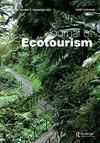导游解说与游客亲环境行为:文化与自然世界遗产地的差异
IF 2.4
Q2 HOSPITALITY, LEISURE, SPORT & TOURISM
引用次数: 0
摘要
摘要导游员在促进游客亲环境行为方面的作用已被文献证实,但关于世界遗产类型如何影响导游员绩效与游客亲环境行为之间关系的研究却很少。文化世界遗产和自然世界遗产在游客行为方面的差异尚未得到充分探讨。本研究旨在探讨世界遗产类型(文化遗产和自然遗产)对导游绩效与游客亲环境行为之间关系的调节作用。一项自我管理的调查用于收集两个最著名的自然和文化whs的数据:约旦的佩特拉考古公园和坦桑尼亚的塞伦盖蒂国家公园。采用PLS-SEM进行多组分析和通径分析。结果表明,世界遗产类型对导游绩效、游客体验、满意度和亲环境行为之间的关系具有部分调节作用。讨论了管理和理论意义及研究方向。关键词:世界遗产、旅游指南、亲环境行为、petraserenge多群体分析披露声明作者未发现潜在利益冲突。本文章由计算机程序翻译,如有差异,请以英文原文为准。
Tour guides’ interpretation and tourists’ pro-environmental behavior: differences across cultural and natural world heritage sites
ABSTRACTAlthough tour guides’ role in encouraging pro-environmental behavior has been confirmed in the literature, little research has been undertaken to examine how world heritage site (WHS) type may influence the relationship between tour guides’ performance and tourists’ pro-environmental behavior. The difference between cultural world heritage and natural world heritage in terms of tourists’ behavior is under-explored. This research aims to assess the moderating effect of world heritage type (cultural and natural) on the relationship between tour guides’ performance and tourists’ pro-environmental behavior. A self-administrated survey was used for collecting data from two of the most famous natural and cultural WHSs: Petra Archeological Park in Jordan and Serengeti National Park in Tanzania. PLS-SEM was employed to conduct multi-group and path analysis. The results showed that world heritage type partially moderates the relationship between the performance of tour guides, tourists’ experience, satisfaction, and pro-environmental behavior. Managerial and theoretical implications and research directions are discussed.KEYWORDS: World heritageTour guidesPro-environmental behaviorPetraSerengetiMulti-group analysis Disclosure statementNo potential conflict of interest was reported by the author(s).
求助全文
通过发布文献求助,成功后即可免费获取论文全文。
去求助
来源期刊

Journal of Ecotourism
Social Sciences-Geography, Planning and Development
CiteScore
6.40
自引率
12.50%
发文量
32
期刊介绍:
The Journal of Ecotourism seeks to advance the field by examining the social, economic, and ecological aspects of ecotourism at a number of scales, and including regions from around the world. Journal of Ecotourism welcomes conceptual, theoretical, and empirical research, particularly where it contributes to the dissemination of new ideas and models of ecotourism planning, development, management, and good practice. While the focus of the journal rests on a type of tourism based principally on natural history - along with other associated features of the man-land nexus - it will consider papers which investigate ecotourism as part of a broader nature based tourism, as well as those works which compare or contrast ecotourism/ists with other forms of tourism/ists.
 求助内容:
求助内容: 应助结果提醒方式:
应助结果提醒方式:


